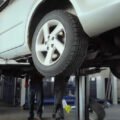
Did you know that a small part attached to a car’s engine can generate enough electrical current to cover most of the car’s power needs? The alternator is an important component that uses the mechanical energy of the engine to power the computer, HVAC and all electrical systems in the car while it’s in motion. This way, the car battery only has to start the engine. Learn about the Nissan Altima alternator to recognize when this important component may need a repair.
How the Alternator Works
The alternator produces an alternating current, or AC current. This car component is similar to a generator that might provide backup power to a house, but it is much smaller and connected to the engine’s crankshaft.
The alternator contains a central rotor and stationary coils that surround it. The rotor is an electromagnet that starts out with a small amount of charge. It is connected to the alternator belt, a pulley that also connects to the crankshaft.
To understand how the car’s engine powers the alternator, let’s turn to the engine quickly. Inside a combustion engine, burning fuel emits gas that moves large components called pistons. Piston pins convert this movement into torsional force that rotates the crankshaft. The crankshaft rotation travels through transmission gears that turn the car’s wheels, allowing it to move.
The alternator belt connects the crankshaft to the alternator’s rotor. As the crankshaft turns, the magnetized rotor turns as well, brushing up against the many stationary coils. This motion causes charge to build up in the surrounding coils, generating an electrical current.
Signs the Alternator Is Failing
Alternators generally stop working gradually, rather than failing all at once. Paying attention to early signs can allow you to get a new alternator through Autozone curbside pickup before you’re in a stressful situation.
If the alternator stops working, the car will no longer have enough electricity to power its many systems. The battery will drain faster, and the engine will struggle to start. Here are some early signs that an alternator is on its way out:
- The battery dies frequently even though it has been replaced in the last few years.
- Power components such as headlights and radio are spotty while driving.
- Starting the engine is slow or difficult even when the battery is charged.
- The engine makes squealing or growling noises while driving.
- The cabin smells like burnt rubber, wire or electrical components.
Alternators typically last between 7 and 10 years. Past that timespan, keep an eye out for signs of a bad alternator.
Common Alternator Repairs
Thankfully, replacing the alternator is a relatively inexpensive engine repair. A new alternator costs about $100 to $200, and with labor costs, the total usually reaches $500 to $600. This is only half the price of replacing a Ford F250 fuel pump.
The alternator is a simple but vital car part that uses the force of the engine to supply electricity. Keep it in good shape by keeping on top of your car’s battery charge and paying attention to early signs of failure.









